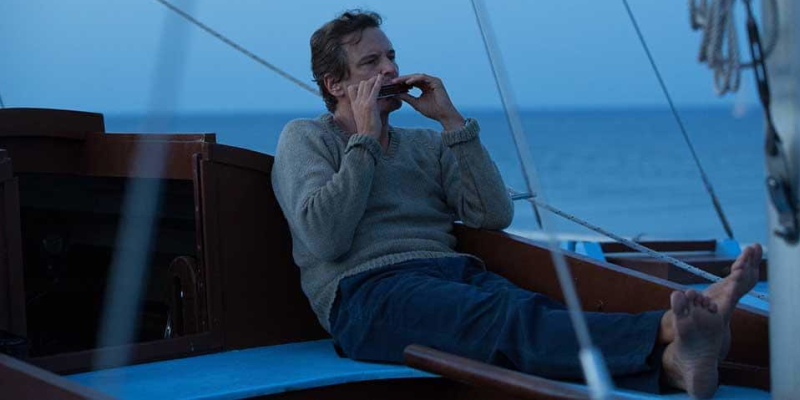 (3 / 5)
(3 / 5)
Director James Marsh makes domestic drama out of an expeditionary tragedy in this slight but sympathetic biopic.
All Is Lost by way of Theory Of Everything, The Mercy delves into the ill-fated attempt of amateur sailor Donald Crowhust’s (Colin Firth) to compete in the 1968 Sunday Times Golden Globe race; an unprecedented non-stop, one-man boat race around the world.
A cause célèbre before ever leaving land, Crowhust was held up as a have-a-go hero – proof that under the right circumstances ordinary people could accomplish amazing things. However, this “tale of derring-do waiting to be told” – so put by Crowhurst’s publicist Rodney Hallworth (a smarmy David Thewlis) – becomes instead a cautionary tale. Backed into a corner by Hallworth and his own financier (a sober-minded Ken Stott), Crowhurst’s only option became to forge ahead, despite his newfound reservations.
Taking to the ocean despite a series of dangerous setbacks. As his craft fails around him and his ambitions slip away, he’s faced by the terrible reality of his situation. To return home is to lose all, his house and his company, but to press on is to die. Crowhurst’s only option then becomes to deceive.
In doing so, however, he finds himself adrift not only from his family, but from the truth and gradually his sanity. Firth, aided only by snatches of increasingly schizophrenic voice-over, can only hint at this; the sweater vest and self-deprecating smile replaced with a slight hollowness in his cheeks and growing desperation in his eyes.
Scott Z. Burn’s screenplay never quite crystallises the widening gulf between the reports Crowhurst sends out, which Hallworth obliviously uses to valorise him, and the inescapable reality of his actual, limping progress. There’s a CGI storm that proves a bit of a washout, so that only a scene in which Crowhurst must shimmy his way up a swaying mast to secure a piece of vital equipment truly encapsulates his vulnerability, his isolation; the yellow of his oilskin bright against the faded teal of the water.
As Donald’s wife, Clare, Rachel Weisz is mostly obliged to put a brave face on things; preparing Christmas dinner alone back in Teignmouth as her husband, sat on the deck of his trimaran, plays Silent Night on his harmonica. Eric Gautier’s cinematography subtly contrasts the bright, welcoming homestead with the faded splendour of the ocean.
Apart from a couple of nice experimental touches – a moment in which Firth’s v.o. threatens to blow out the speakers, or the sound of the ocean blooping against the hull – The Mercy is too unassuming to be striking; too gentle to truly drive home the horror of its protagonist’s situation.
While it’s tempting to imagine the power and depths a more adventurous director, like Werner Herzog, might have done with this story, The Mercy lives up to its title; finding a sort of sad, redemptive grace in Crowhurst’s fate; even if the film as a whole is never quite prepared to cut its lifeline.
